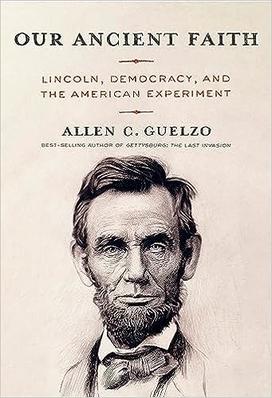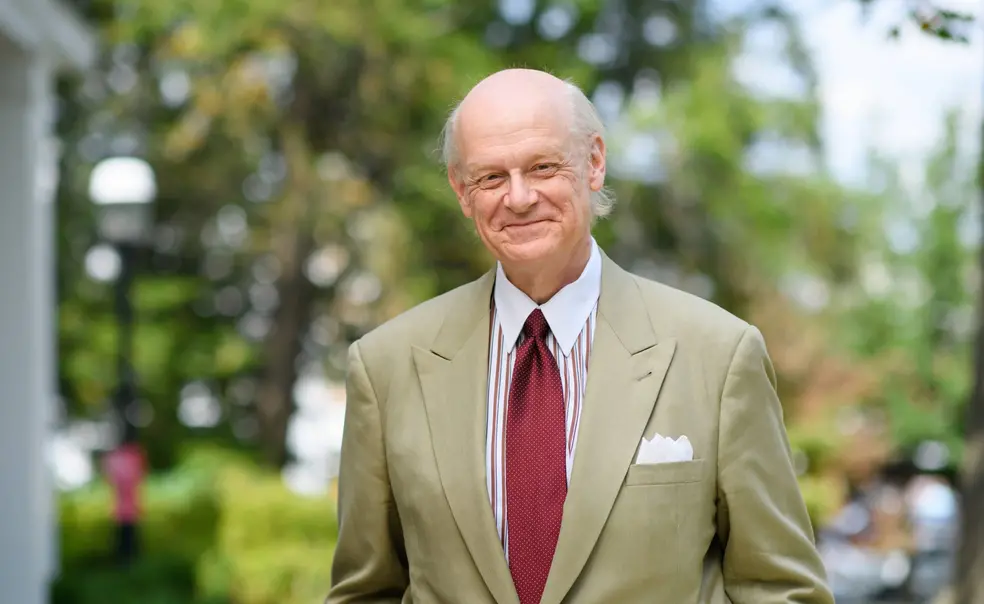Professor Allen C. Guelzo Unpacks Abraham Lincoln’s Beliefs on Democracy in New Book
The book: In his latest book, author Allen C. Guelzo examines Abraham Lincoln’s penetrating ideas and beliefs about democracy. Throughout he clearly illustrates Lincoln's deep commitment to balance and firm belief in democracy’s value in society. Guelzo captures Lincoln’s humanity and brings him to life, while assessing his actions of civil liberties and views on race, among other aspects of his character. Our Ancient Faith (Knopf) ultimately gives readers a deeper understanding of Lincoln.

The author: Allen C. Guelzo is the Thomas W. Smith Distinguished Research Scholar in the James Madison Program in American Ideals and Institutions at Princeton University. He is also the director of the Madison Program’s Initiative on Politics and Statesmanship. An expert on Abraham Lincoln, Guelzo is the author of several books including Abraham Lincoln: Redeemer President, Lincoln’s Emancipation Proclamation, and Lincoln and Douglas.
Excerpt:
Introduction: The Disposition of Democracy
We have all heard the dreary complaints at one time or another, and now perhaps more than ever. Democracy is the worst form of government except for all the others (according to Winston Churchill). Democracy is the rule of hooligans (according to Jason Brennan). Conventional democratic ideas are fairy tales (according to Christopher H. Achen and Larry M. Bartels). Democracies have no use for beauty or community (according to Ryszard Legutko). Democracies die at the hands of the governments they elect (according to Steven Levitsky and Daniel Ziblatt). Two cheers — and only two cheers — for democracy (according to E.M. Forster).
Perhaps none of this should strike us with any great surprising force. We have lived through a century in which democracies have been repeatedly tried, and repeatedly failed, or worse, been easily subverted or overthrown. And the most recent failures were cruelest in their impact for having arrived, after 1991, at a moment when democracy seemed to have emerged unchallengeable from a generation-long struggle with its most serious totalitarian rival. Solidarność triumphed in eastern Europe; the Berlin Wall crumbled and the Soviet overlords disappeared; the Goddess of Freedom reared her torch on Tiananmen Square.
And then, almost as quickly, democracy sagged and, in many places, collapsed. Tiananmen Square was brutally emptied; a former Soviet intelligence operative shrewdly twisted post-Soviet elections into a nationalist authoritarianism; the fastest-growing and most aggressive economy in the world belonged to a repressive dictatorship which had been fathered by one of the most genocidal minds of modern times. According to the annual surveys published by Freedom House, the number of people living in genuinely democratic states has fallen by more than half since 2003.
Yet, at the same moment, real democracies too often allow themselves to be judged by the pitiless standards of their rivals. They drown themselves in guilt for any absence of perfection, ignore real imperfections with indignation, and imagine every difficulty to be a crisis. They are as vulnerable to their own self-criticism as they are to external aggression. The biographer of democracy’s earliest champion has now spoken of democracy as “one of the rarest, most delicate and fragile flowers in the jungle of human existence.” After all, he reasoned, democracy was the rule of the day for only two hundred years in its birthplace, Athens, and disappeared thereafter for two millenia. If durability and persistence were the measure of political success, the intervening centuries of monarchy, oligarchy and despotism would send democracy to the bottom of the most-desired list of political theories.
The United States of America is the longest, still-functioning large-scale democracy in the world. Created as a republic on the model of republican Rome in the late eighteenth century, it had a strong democratic torque from the beginning which only became more pronounced in its first four decades of life. Its founding documents — its Declaration of Independence from Great Britain, and its federal Constitution of 1787 — articulate many of what have become accepted as fundamental principles of a democracy: the natural equality of all humanity (as opposed to ‘natural’ hierarchy), a national government of explicitly-limited powers, and a separation of even those powers within the national government.
But the United States was — and is — by no means a pure democracy. Even in 1787, the sheer size of the American republic seemed to make the model of democracy everyone knew best — the face-to-face democracy of ancient Athens — impractical, if not downright dangerous, and that impracticality has only grown more mountainous as the average size of congressional districts spills over the line of 700,000 people. Even more troubling to the American founders were the reminders that Athens’ democracy had not always behaved well or wisely. The Athenian assembly made heroes of scoundrels like Alcibiades, and martyrs of free-thinkers like Socrates. “There is,” warned James Madison, the chief among the American constitution’s architects and defenders, “a degree of depravity in mankind, which requires a certain degree of circumspection and distrust,” and nowhere was that distrust more justified than in democracies. “Had every Athenian citizen been a Socrates,” Madison warned, “every Athenian assembly would still have been a mob.”
With that caution in view, the American Constitution of 1787 laid major restraints on the way in which the American republic could be said to be democratic. The republic was to be a federal republic, a Union, an association of quasi-independent states; and the chief officer of the republic, the president, would be elected by the states, through an ingenious mechanism called the ‘electoral college.’ The national legislature would be elected, partly by direct vote every two years (and called the House of Representatives), but also partly by the state legislatures every six years (and, in homage to republican Rome, called the Senate). The federal judiciary was elected by no one; its members were appointed by the president and confirmed by the Senate. Rome, not Athens, was its aspiration, and its first president was hailed as a Cincinnatus, not a Pericles.
Still, the forces let loose by American independence and the revolutionary war fought against Great Britain for that independence all marched in democratic directions. Many of the north American colonies were founded as private franchises, and frequently by Protestant religious dissenters who consciously stood outside the mainstream of English culture. For almost a century, successive British governments happily left them to their own devices, and to their own ad hoc legislatures and finances. That, as the Revolution’s historian, David Ramsay, wrote in 1789, “generated ideas, in the minds of the colonists, favorable to liberty … . They had in effect the sole direction of their internal government.” So, when, in the 1760s, imperial planners in London tried to substitute forms of direct control from the imperial metropolis, the colonies balked. The colonial assemblies were small, met infrequently, and imposed little in the way of legislation; nevertheless they were based on a surprisingly broad spread of qualified electors -- or at least broader than anything seen anywhere else in the world. By the time the colonies revolted, Americans (wrote Rene de Chateaubriand, after his tour of America in 1791) “were already accustomed to the public discussion of the interests of the people … by virtue of which they governed themselves, and managed their own affairs.”
The American Revolution’s aftermath did nothing to change that attitude. The American upper classes — the Washingtons, Jeffersons, and Madisons — had been upper only by contrast with the “lower sort” beneath them. Set beside the English landed gentry from whom they had disengaged themselves, the American elite were small potatoes, and the bumptious commercial classes of mechanics, artisans, shopkeepers and speculators made them feel it, too.
By 1792, property restrictions on voting eligibility had disappeared in half of the states. By 1808, voter turnout for popular elections in Pennsylvania and Massachusetts had reached 70 percent of those eligible under the laws — in some Maryland counties, it actually exceeded 80 percent — and observers were shedding any reluctance to describe the American government as a democracy.
If anything, Americans now boasted that their system was “not as some affirm, democracy rejected, but democracy made easy,” and constituted the “most splendid discovery of modern times.”
Excerpted from Our Ancient Faith by Allen C. Guelzo. Reprinted by permission of Knopf.
Review:
“As the subject of thousands of studies, Lincoln is one of American history’s most written-about individuals. It is therefore a welcome surprise to read such fresh insights as Guelzo musters here ... . In an era when democracy’s death is shouted from the front page of seemingly every U.S. newspaper, it is comforting to read that Abraham Lincoln, at least, thought the effort to maintain it was not in vain.” — Booklist












No responses yet